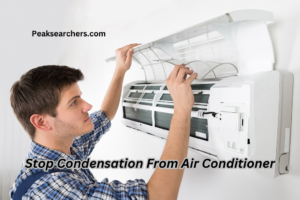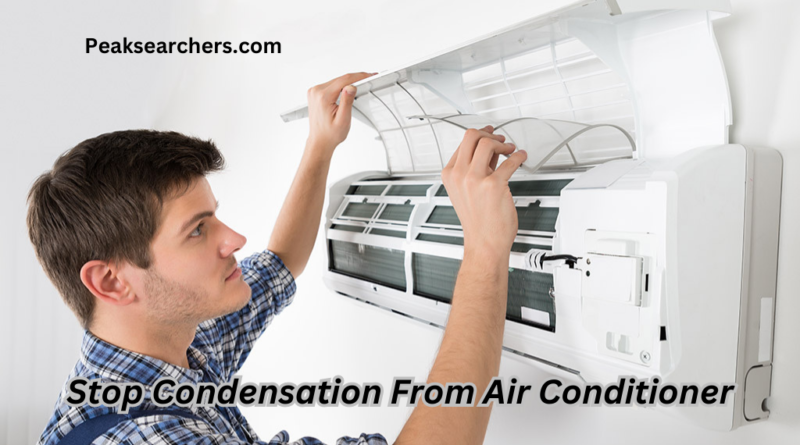How To Stop Condensation From Air Conditioner – Truth Revealed
Condensation is a common occurrence when using an air conditioner, especially during the hot and humid summer months. However, excessive condensation can cause damage to your home and affect the efficiency of your cooling system. Understanding what causes condensation and how to Stop Condensation From Air Conditioners is key to keeping your home comfortable and safe.
Fortunately, there are several steps you can take to prevent excessive condensation from forming in your home. What you need to do is simply follow this step-by-step guide and you will be successfully able to get the problem solved.
In my case, my AC was condensing frequently due to which I was unable to get the required cooling from my AC. I was quite intimidated because I did not know what to do. Then, I surfed the internet and was finally able to solve this issue. Everything is explained in detail regarding this issue in the blog post.

Understanding how an air conditioner works
Condensation is a common problem with air conditioners, especially when the weather is humid. It occurs when warm, moist air comes into contact with the cold surface of the evaporator coil inside the AC unit.
As a result, water droplets form on the coil and can drip down onto floors or furniture. This can cause damage to your property and create an uncomfortable environment.
To stop condensation from forming on your air conditioner, it’s important to understand how it works. The basic principle behind an AC unit is that it cools indoor air by removing heat and moisture from it.
This process involves circulating refrigerant through a series of coils inside the unit. As warm indoor air passes over these coils, it transfers heat to them, causing the refrigerant to evaporate and cool down.
To prevent condensation from occurring on your AC unit, you need to make sure that there’s adequate airflow around it. You can achieve this by keeping plants or other objects away from the outside of the unit and ensuring that there are no obstructions blocking its vents or ducts. For more, read the article.
Common causes of excess condensation
One of the most common causes of excess condensation in air conditioning units is a dirty or clogged air filter. When your air filter is dirty, it restricts airflow and can cause the evaporator coils to freeze over. When this happens, excess moisture can build up on the coils and eventually drip down into your home.
Another potential cause of excess condensation is an improperly sized AC unit. If your unit is too large for your space, it may cool your home too quickly without properly dehumidifying the air. This can result in excess moisture buildup and increased condensation.
Lastly, inadequate insulation can also lead to excess condensation. If warm, humid air from outside seeps into your home through poorly insulated windows or doors, it can create a temperature difference between the inside and outside of your home that leads to increased condensation on surfaces like walls or windows.
Ensuring proper insulation throughout your home, particularly in areas where you are experiencing excessive moisture buildup, can help prevent this issue from occurring.
Tips for reducing humidity in your home
One of the most common causes of high humidity levels in a home is the air conditioner. While it helps to regulate the temperature indoors, air conditioners can also create condensation that leads to excess moisture.
To reduce humidity in your home caused by an air conditioner, start by regularly cleaning or changing the filters. Dirty filters impede proper airflow and cause the unit to work harder than necessary, leading to higher humidity levels.
Another solution is to use a dehumidifier. A dehumidifier absorbs excess moisture from the air and reduces humidity levels in your home. You can place one near your air conditioning unit or other areas where high humidity is detected such as bathrooms or laundry rooms.
Additionally, it’s important to make sure that any leaks or water damage are promptly addressed as they can contribute significantly to indoor moisture levels and ultimately lead to mold growth. By taking these steps, you’ll be able to control indoor humidity. Improve your overall indoor air quality for a healthier living environment.
Steps to stop condensation from AC
Firstly, it is important to keep your air conditioner in good condition. Regular cleaning and maintenance will help prevent condensation buildup. Ensure that the filter is clean and not clogged with dust or debris as this can restrict airflow which may cause excess moisture buildup.
Secondly, ensure that the air conditioner unit is at the right size for your room. If it’s too small, it will struggle to regulate temperature effectively while a larger AC unit may cool the room too quickly leading to excessive moisture buildup.
Thirdly, if you still experience condensation build-up even after taking steps 1-2, consider installing a dehumidifier in addition to your air conditioner. This device works by removing excess moisture from the air thereby preventing condensation from occurring.
In conclusion, stopping condensation from an AC requires regular cleaning and maintenance of the unit as well as ensuring that your AC is sized correctly for your room. A dehumidifier may also be necessary where other measures have failed.
FAQ’s
Q: Why is water coming out of my air conditioner?
A: If you see water dripping or pooling around your air conditioning unit, it’s likely due to condensation. As warm indoor air passes over the cold evaporator coil in the AC unit, moisture in the air condenses and collects on the coil.
This water then drips down into a pan and drains away outside of your home through a drain line.
Q: Is it normal for my air conditioner to produce condensation?
A: Yes, it’s normal for an AC unit to produce some level of condensation as part of its cooling process. However, excessive amounts can be a sign that something is wrong with your system or that there are issues with insulation and ventilation in your home.
Q: What can I do to stop excess condensation from my AC unit?
A: There are several steps you can take to reduce the amount of condensation produced by your air conditioning system. First, make sure that all windows and doors are properly sealed to prevent warm outdoor air from entering your home and adding humidity.
Additionally, consider installing a dehumidifier or improving ventilation throughout your home. Finally, have regular maintenance performed on your AC unit by a professional technician. You need to ensure that it’s running efficiently and effectively.
Also read: How To Clean Air Conditioner Outside Unit – A DIY Solution
Conclusion
In conclusion, managing condensation from air conditioners is a simple process that can be achieved through proper installation and regular maintenance. The first step to preventing condensation is by ensuring proper insulation around the air conditioner unit. This helps to prevent warm air from infiltrating the cold coils and causing moisture to form.
Regular cleaning of filters and coils is also essential in maintaining the optimal performance of an AC unit. Clogged filters can cause poor airflow, which can lead to an increased likelihood of condensation buildup.
Additionally, it is important to have your AC unit serviced annually by a professional technician who will identify and fix any potential problems before they become major issues.
In summary, following these steps will not only help prevent unwanted moisture accumulation but also extend the lifespan of your AC unit while improving overall indoor air quality. With these tips in mind, you can enjoy efficient cooling during hot summer months without worrying about excess condensation damage or decreased performance.


